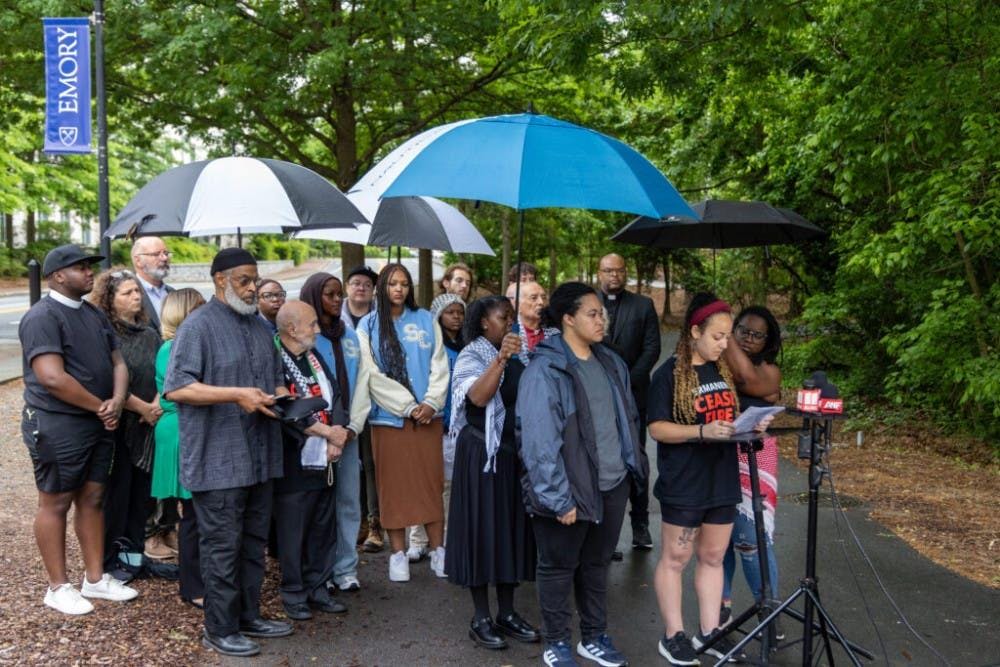U.S. President Donald Trump’s executive actions targeting pro-Palestine individuals have caused dissent nationally, including at Emory University. Emory School of Law’s National Lawyers Guild (NLG) hosted a “Palestinian Human Rights and the Limits on Freedom of Expression” event featuring immigration attorneys, human rights attorneys and former Emory School of Medicine student Umaymah Mohammad, who Emory suspended for violating “professional conduct” after saying a professor who volunteered in the Israeli Defense Forces “participated in aiding and abetting a genocide.”
The panel focused on the work of the Georgia chapter of the Council on American-Islamic Relations (CAIR-Georgia), which protects the civil rights of Muslims through legal action and advocacy, according to CAIR-Georgia Legal Director and panelist Javeria Jamil. During the event, the panelists also spoke about their concerns for the safety of protesters after recent Trump administration policies.
Mohammad emphasized the importance of her support system after her suspension from Emory’s medical school.
“When I was suspended in December of last year, … I was introduced to a global network of healthcare workers throughout the world who have also been repressed, who have also been suspended, some fired, some harassed for they’re anti-genocide organizing, but who are also fighting alongside me for a liberated world,” Mohammad said.
Mohammad responded to a question about safety for student protestors and said that students should be ready to create “safety plans,” especially amid rising Islamaphobia.
“The way that I see it is that we are already unsafe, like our everyday lives, we are not safe,” Mohammad said. “Even before, growing up as a Muslim, we have already been afraid of [the Department of Homeland Security] and the FBI and people coming for our family members for illegitimate reasons.”
Immigration and Customs Enforcement (ICE) recently forcibly restrained and arrested a Tufts University (Mass.) doctoral student, Rumeysa Ozturk, who was involved in pro-Palestinian activism. The Trump administration has also canceled about 530 visas of students, faculty and researchers across 88 higher institutions.
Jamil urged students to learn about their rights, particularly when dealing with ICE. She emphasized the need for pro-Palestine students to keep themselves safe in the current political climate.
“Folks generally need to brush up on their rights when they interacting with law enforcement,” Jamil said. “Whether that’s in a private space or a public space, what that means for them, what they can and cannot do if something does happen, they need to make sure that they have emergency contacts in place who can call for legal help for them and can be their support system if they are abducted or jailed.”
Jamil said she would like the Emory administration to publicly condemn the Trump administration’s recent actions.
“The Trump administration is coming after any children of color right now, and it is really important for the university to exercise its … power and come out and help you condemn the Trump administration,” Jamil said.
After the event, Emory NLG President-Elect Mary Thomas (27L) encouraged her fellow students to be aware of the reality of protesting in 2025. Similar to how Harvard University (Mass.) reacted to the Trump administration’s policies, Thomas advocated for Emory to push back and protect its students.
“Students should feel safe and protected by their schools,” Thomas said. “We saw just today, with Harvard not bowing down to the demands of the Trump administration, really seeing schools stand up on behalf of their students, because at the end of the day, that’s what makes a school a school, is the students.”





